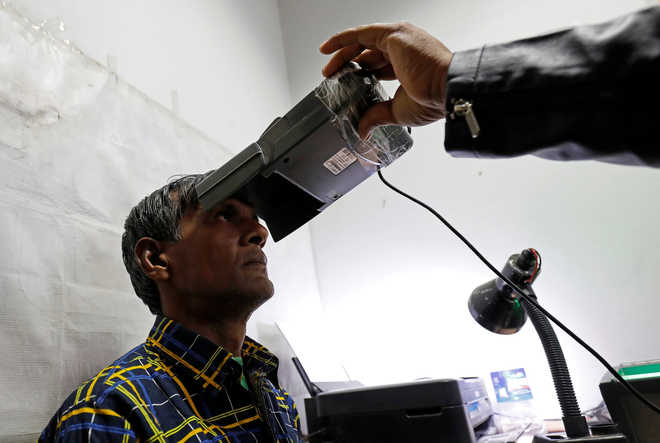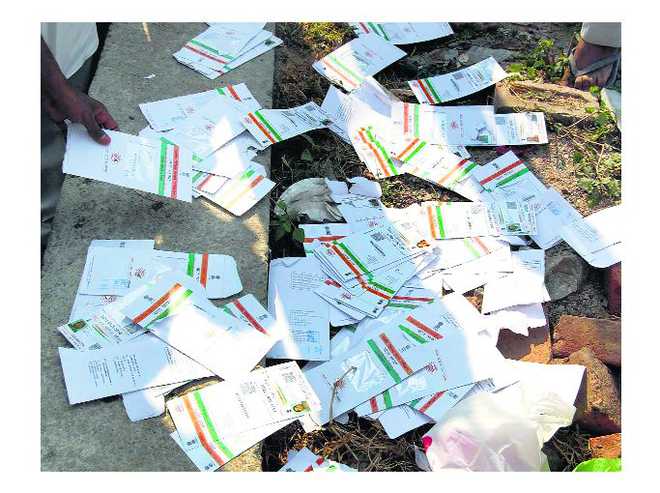
The Supreme Court has upheld most of the provisions of the Aadhaar Act thus avoiding the fate of telecom and coal licences where its wholesale cancellation approach had sent both sectors into the NPA shoebox. In Aadhaar at stake was the taxpayer’s money in the project as well as his right to adequate privacy. Both seem to have been preserved. Aadhaar’s designers walk away with bouquets after the court ruled out profiling because of inbuilt safeguards. The 4-1 majority judgment also ruled out the possibility of obtaining a duplicate Aadhaar card, was satisfied with the adequacy of defence mechanisms for authentication and felt the data obtained was minimal while benefits, especially to the marginalised, large.
But for the political executive that was muscular, proactive and overbearing in trying to make it mandatory in all services, the order should serve as timely catnip. Aadhaar as a project will survive but only in matters of state-government welfare schemes and PAN but not for school admissions, banking and mobile services. The striking down of Sections 33 and 57 and the reading down of Sections 33 (1) and 33 (2) was very nearly an endorsement of the Rajya Sabha’s concerns that were pointedly overlooked while packaging the Aadhaar legislation as a money bill.
Now that Aadhaar survives in a watered down, truncated version, the executive needs to follow up appropriately. As a first step, Aadhaar cards should be delinked from mobile connections and bank accounts, which the court has said was unconstitutional. Hopefully, the government’s narrow escape with regard to the money bill approach will dissuade it from taking this route again to avoid going through the test in Rajya Sabha. Court adjudications at the end of the day are a matter of judgment and the executive needs to heed the dissenting opinion, especially the warning that the absence of an independent regulatory framework compromises data protection. As for the ‘right to privacy’ zealots, some of their assumptions and apprehensions were, in hindsight, overblown. But thanks to their perseverance, a balance was struck.
Ironing the wrinkles in Aadhaar


Abhijit Bhattacharyya
Supreme Court Advocate
People of India created, and gave to themselves the Constitution. Constitution created Parliament. Parliament created Aadhaar. Judges of the Supreme Court interpret the legal validity or invalidity of the law created by Parliament. Hence the Constitution of India is supreme, unlike the British system in which Parliament is the creator of the constitution, though unwritten.
Therefore, when Parliament, being the creation of the Constitution, makes law, it has to pass legal scrutiny to ensure that it doesn’t override the basic features of the Constitution. The importance of today’s court verdict emanates therefrom. Nevertheless, prima facie does exist a real danger of writing on a 1,448-page verdict without fully going through it (it would have taken a minimum of two days to read and digest). Prudence, therefore, demands to refer to salient features which are in public domain.
The most striking feature of the Aadhaar verdict today, undoubtedly, is the sole dissenting voice from the Bench, which stood 4-1. If true, that ‘Aadhaar as a money bill’ is a wrong perpetrated on the Constitution, being ‘politically expedient but constitutionally impermissible’ and that ‘Section 139AA of Income Tax is unconstitutional’, Aadhaar is likely to re-emerge as live issue for future, and further Supreme Court litigations. It’s a situation in which minority logic makes majority language a future cause of legal action.
The stamp of constitutional validity on Aadhaar, however, is the biggest news, striking down of a few sections thereof notwithstanding. In overall perspective, the judiciary has reiterated the supremacy of the State’s role, rather Parliament’s role, in making law, through the government, in certain basic welfare schemes reaching the comparatively marginalised section of society.
In contrast, the striking down of Section 33(2) pertaining to national security exemption for disclosure of Aadhaar information is unlikely to go down well with a section of departments and officials dealing with the issue of State. Prima facie, though it runs in tune with the spirit of democracy of the Indian Union, nevertheless, there also could be situations challenging enough, cropping up before the Supreme Court.
The best part of the verdict emanates from delinking it with the education system. That is a welcome relief for both parents and children as it was creating an incurable headache of sorts all around the countryside. The court certainly deserves a big ‘thank you’ from millions.
The two most important points around which the entire Aadhaar came up for lengthy litigation now need to be looked into. First, right to individual privacy, which could also be thought of as an extension and continuation of right to individual liberty, falling under fundamental rights as guaranteed by the Constitution vide Articles 12 to 35; and second, the PAN-Aadhaar interfacing which has been raised by the dissenting judge of the 4-1 verdict.
No doubt ‘right to privacy’ does not have an exclusive and explicit existence in the Constitution, yet the first, third, fourth and fifth Amendment, along with several Supreme Court verdicts, recognise its existence and importance. Articles 19, 21 and 22 constitute a robust enough bulwark against State encroachment into an individual’s fundamental rights.
Yet when Aadhaar was introduced, there emerged legitimate concerns pertaining to the intrusion of the State into a citizen’s right to privacy, linked to fundamental rights. The counter argument here too could be considered, being the points of ‘devil’s advocate’! Which fundamental right be considered eternally sacrosanct and unlimited in a diverse society of historically fissiparous forces? Secondly, did not the fundamental right to property undergo transformation in the past? Between property and privacy, which supersedes whom? Are they contradictory? Or complementary?
Having said that, one is constrained to point out that the very linking or interfacing of PAN and Aadhaar has its own dynamics, which in a way amounts to the indirect entry of Aadhaar in places even when and where it is not required to be present vide the verdict of the Supreme Court.
The question is, how is it possible? It is not only possible, it will be reality, especially for the 5 crore income tax payees, though not necessarily for the rest of the 120 crore heads who fall below the income tax net. Section 139AA of the Income tax Act makes the PAN-Aadhaar link mandatory for annual tax returns for all — company and individual. However, though Aadhaar is not mandatory for opening a bank account, the production of PAN before bank officials would automatically reveal the Aadhaar number and identification of the potential tax-paying client of the bank. That by itself would amount to the entry of the client, with automatic exposure of his Aadhaar to the bank.
To be fair to the law and the verdict thereon, however, the majority of Indians have been exempted from undergoing the process of production of Aadhaar to the banks, which more often than not did not inspire the desired level of confidence, especially among those using small and common banks.
All in all, the verdict cannot be said to be an exercise in futility; all the more because the judiciary has asked the government to ensure that the security of privacy is not breached. The entire issue began with it. Law of the land in India is usually made with the best of intentions, excellent ideas and high hopes. However, the traditionally weak implementation thereof along with a system of non-diminishing corruption (in the past) has ruined many a plan, thereby making law more a liability than an asset. Hope the verdict brings brighter days for the country.
